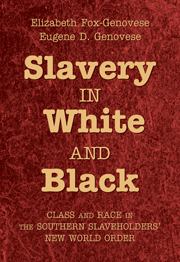Book contents
- Frontmatter
- Contents
- Preface
- Manuscript Collections Cited
- List of Abbreviations
- Slavery in White and Black
- Introduction
- 1 The Impending Collapse of Capitalism
- 2 Hewers of Wood, Drawers of Water
- 3 Travelers to the South, Southerners Abroad
- 4 The Squaring of Circles
- 5 The Appeal to Social Theory
- 6 Perceptions and Realities
- Afterword
- Index
4 - The Squaring of Circles
Published online by Cambridge University Press: 05 June 2012
- Frontmatter
- Contents
- Preface
- Manuscript Collections Cited
- List of Abbreviations
- Slavery in White and Black
- Introduction
- 1 The Impending Collapse of Capitalism
- 2 Hewers of Wood, Drawers of Water
- 3 Travelers to the South, Southerners Abroad
- 4 The Squaring of Circles
- 5 The Appeal to Social Theory
- 6 Perceptions and Realities
- Afterword
- Index
Summary
If I furnish my negro with every necessity of life, without the least care on his part – if I support him in sickness, however long it may be and pay all his expenses, though he does nothing – if I maintain him in his old age, when he is incapable of rendering either himself or myself any service, am I not entitled to an exclusive right to his time?
—Bennet H. BarrowFrancois Quesnay, father of Physiocracy and personal physician to Louis XV and Madame du Pompadour, formulated the first analysis of the circular flow of economic life. A man of genius, he ended his life in a valiant mathematical endeavor to square the circle. The South had no such genius but did have a number of accomplished political economists. George Tucker of Virginia contributed to the theory of economic development and – trailed by J. D. B. De Bow of Louisiana – did valuable work in statistics, notably with his Progress of the United States in Population and Wealth in Fifty Years (1855). Jacob Cardozo of South Carolina qualified as an econometrician, especially respected for his analyses of the tariff problem. Thomas Roderick Dew of Virginia, a sound expositor of classical political economy, doubled as an acute historian of the power and limits of economics in human affairs. Louisa Susanna (Cheves) McCord of South Carolina kept southern intellectuals abreast of developments in French political economy.
- Type
- Chapter
- Information
- Slavery in White and BlackClass and Race in the Southern Slaveholders' New World Order, pp. 152 - 195Publisher: Cambridge University PressPrint publication year: 2008



